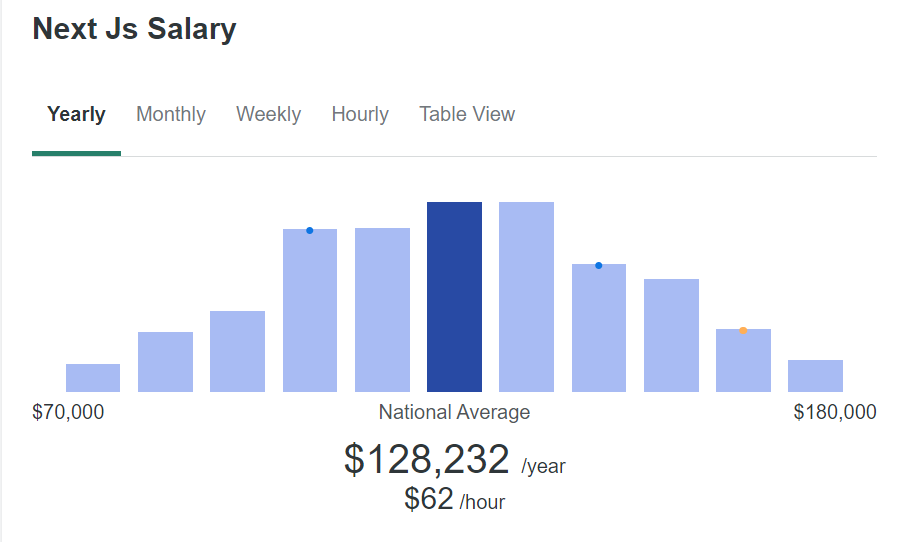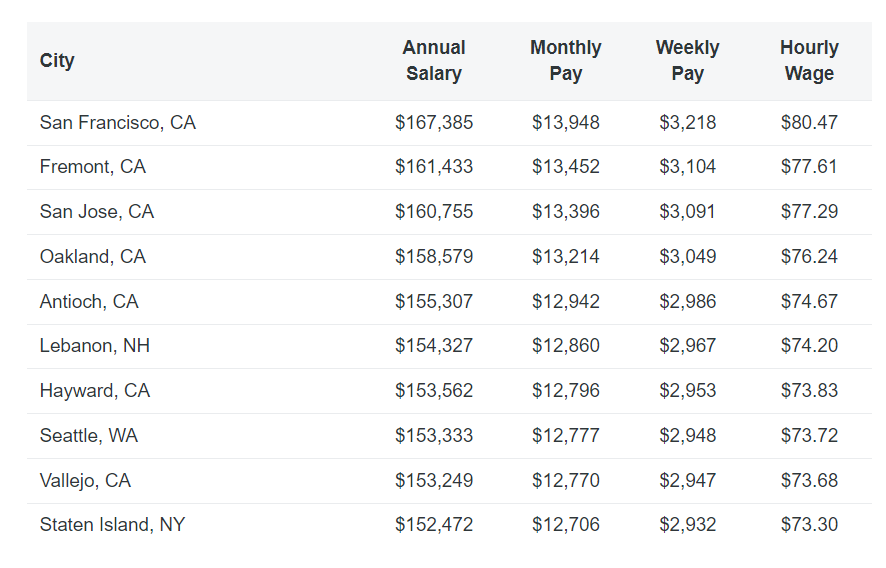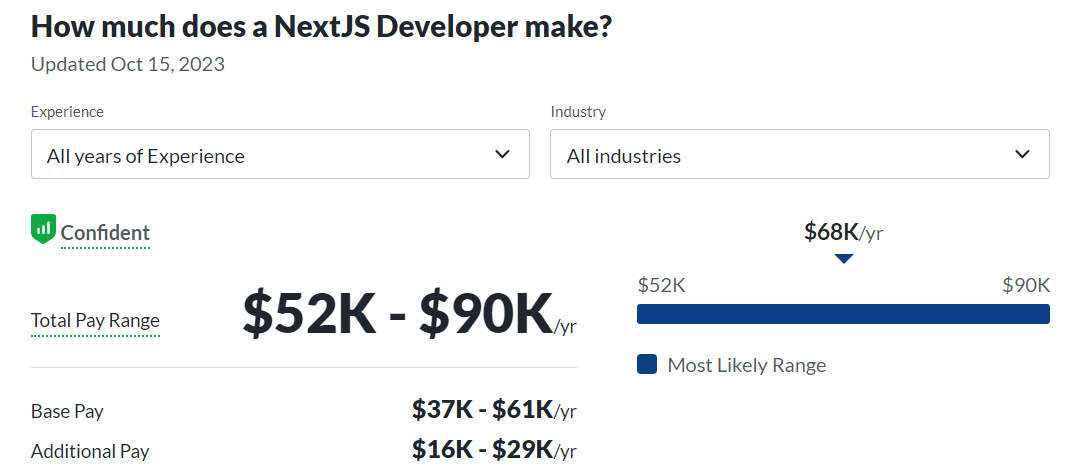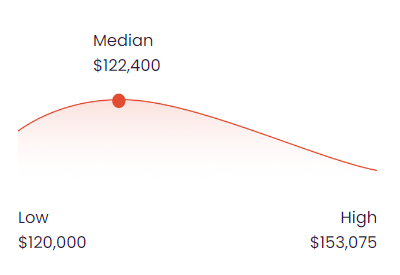A Comprehensive Guide to Next.js Developer Annual Salaries
According to data from ZipRecruiter, the average annual pay for a Next.js developer in the United States stands at $128,232. Breaking down this figure further, a significant majority of Next.js developers earn between $108,500 (representing the 25th percentile) and $146,000 (representing the 75th percentile). Those at the top of the salary range, belonging to the 90th percentile, can expect to earn as much as $164,000 annually.
Table of Contents
A Look at Next.js Developer Salaries at Each Career Stage
As Next.js developers gain experience, their earnings tend to rise. Beginners start on the lower end of the pay scale, but as they move through mid-level to senior positions, and ultimately to lead or principal roles, their compensation increases notably. This pattern emphasizes the importance of experience in the field and the growing demand for Next.js expertise in the industry and it is vital to have an understanding of the going rates for the tech stack when you hire Next.js developers for your project requirements..
| Experience Level | Average Annual Salary Range |
|---|---|
| Junior Developer | $80,000 - $115,000 |
| Mid-Level Developer | $110,000 - $142,000 |
| Senior Developer | $140,000 - $175,000 |
This data from ZipRecruiter, further suggests that a Next.js developer is capable of making an average of $121,124 per year, which is a little lower than the national annual average salary of a Next.js developer ranking through the states.

ZipRecruiter also provides us with information about the top ten cities in the US that pay the most for Next.js developers, ranking at the top is San Francisco, CA. The difference between the salaries is as little as 9% between San Francisco, CA, and Staten Island in NY, which reinforces the limited potential for wage advancement.

Nevertheless, Glassdoor brings us with a few minor different statistics. Glassdoor suggests that the median estimated total pay for a beginner NextJS Developer in the United States area is $58,478 per year. This includes an average salary of $43,140 per year and an estimated additional pay of $15,339 per year.

A Global Overview of Next.js Developer Annual Salaries
North America stands out with the highest salary ranges, followed by Australia and Western Europe. Eastern Europe and South America offer moderate compensation, while Asia and Africa generally propose the lowest ranges. These variances can be attributed to factors such as regional economic development, tech industry presence, and local cost of living.
According to talent.com, the average next js developer salary in the USA is $122,400 per year or $58.85 per hour. Beginner and low-experienced Next.js developers start at $120,000 per year while most experienced workers make up to $153,075 per year. These statistics can be related to other countries in the North American region.

However, it’s essential to note that while base salaries might be higher in certain areas, other factors like quality of life, work-life balance, and local opportunities can also play significant roles in a developer’s choice of workplace.
| Location | Average Annual Salary Range |
|---|---|
| North America | $110,000 - $140,000 |
| South America | $20,000 - $50,000 |
| Western Europe | $65,000 - $110,000 |
| Eastern Europe | $25,000 - $55,000 |
| Australia | $70,000 - $115,000 |
| Asia | $15,000 - $50,000 |
| Africa | $10,000 - $35,000 |
Stacking Up Annual Salaries: Next.js Developers vs. Other JavaScript Counterparts
Next.js developers earn a slightly higher average salary in comparison to other JavaScript frameworks, indicating its rising demand and prominence in the industry. While React.js and Node.js developers trail closely behind, technologies like Angular and Express.js command moderate pay scales. Vue.js, Svelte, and Gatsby developers are on a similar scale, with Ember.js developers experiencing a slightly lower salary range. The nuanced differences in compensation can be attributed to the specific demand-supply dynamics, maturity, and versatility of each framework in the current market.
| JavaScript Framework | Average Annual Salary Range |
|---|---|
| React.js Developer | $105,000 - $135,000 |
| Angular Developer | $100,000 - $130,000 |
| Vue.js Developer | $95,000 - $125,000 |
| Svelte Developer | $95,000 - $125,000 |
| Node.js Developer | $105,000 - $135,000 |
| Express.js Developer | $100,000 - $130,000 |
| Gatsby Developer | $100,000 - $130,000 |
| Ember.js Developer | $90,000 - $120,000 |
Comparing Next.js Developer Salaries with Other Programming Languages
Next.js developers earn well compared to those in other programming areas, showing how in-demand the JavaScript programming language is. Go and Swift developers have salaries close to Next.js, with Python and Ruby not far behind. On the other hand, PHP, C#, and SQL developers make a bit less. HTML/CSS developers earn the least, suggesting they often need more skills to boost their pay. In short, these pay differences highlight the changing importance and demand for each technology.
| Programming Language | Average Annual Salary Range |
|---|---|
| Python Developer | $95,000 - $130,000 |
| HTML/CSS Developer | $110,000 - $140,000 |
| PHP Developer | $80,000 - $110,000 |
| C# Developer | $90,000 - $120,000 |
| Ruby Developer | $100,000 - $130,000 |
| Swift Developer | $100,000 - $135,000 |
| Go (Golang) Developer | $110,000 - $150,000 |
| SQL Developer | $85,000 - $115,000 |
Conclusion
When you are in the process of hiring Next.js developers, it is essential to consider factors such as their experience level, geographic location, and specific project requirements. By aligning these critical elements, you can attract and select the ideal Next.js developer who possesses the requisite skills and expertise to make meaningful contributions to your team’s success. To aid you in this process, we have curated a range of resources designed to assist in hiring Next.js developers for your software development projects. Our website hosts valuable articles on the Next.js developer hiring guide, Next.js developer job descriptions, Next.js developer hourly rates guide, and Next.js developer interview questions.
Table of Contents






